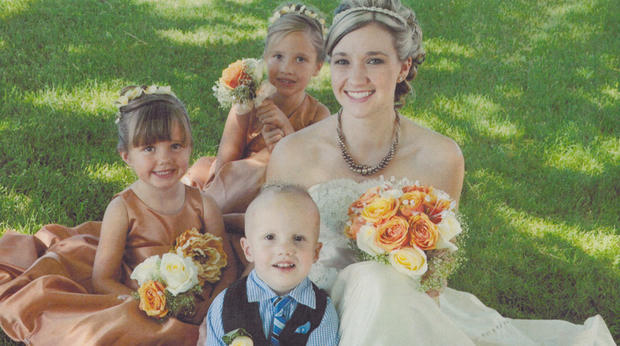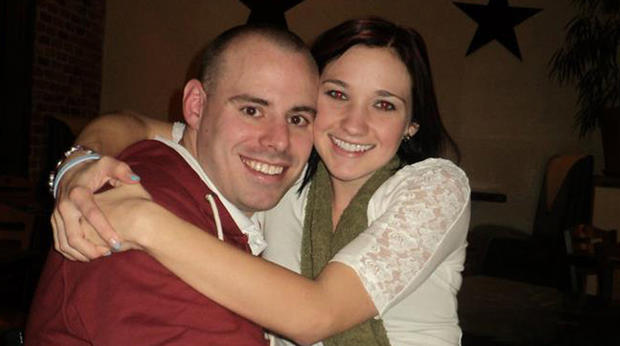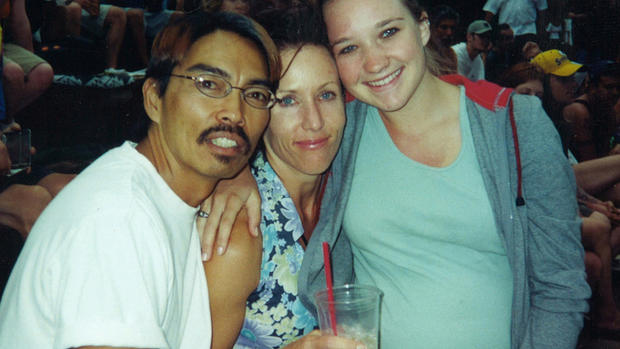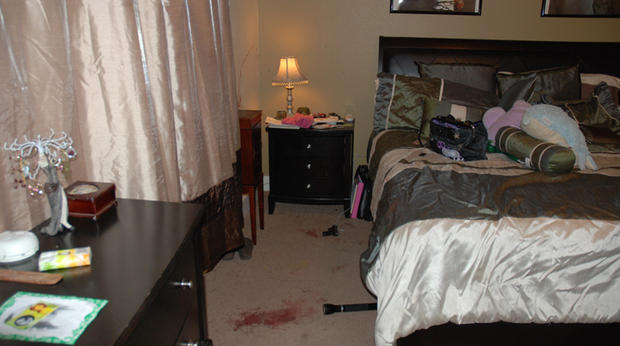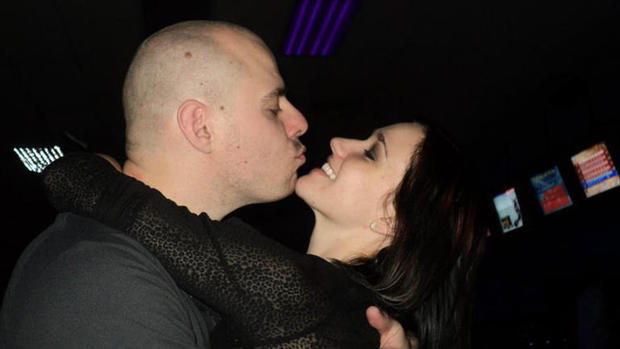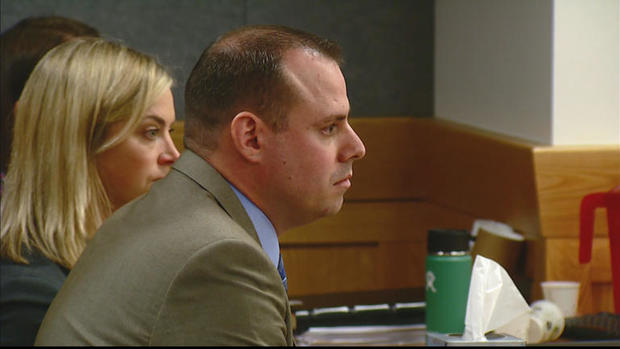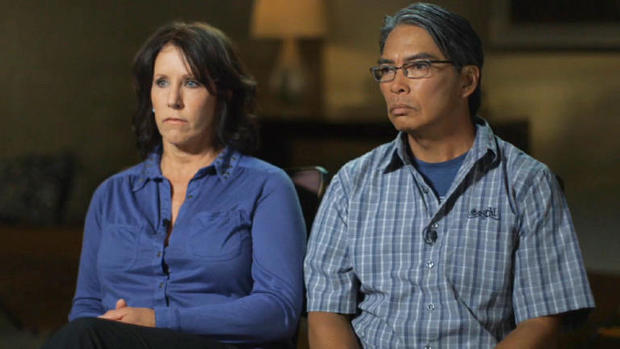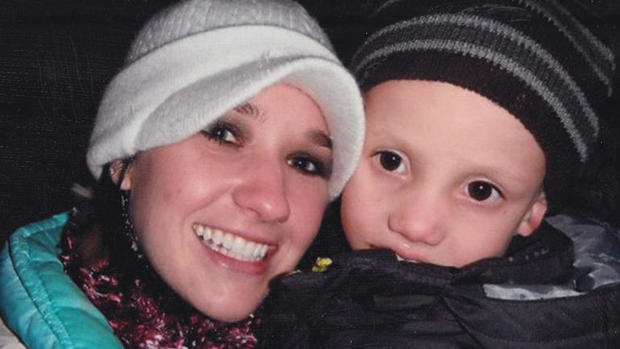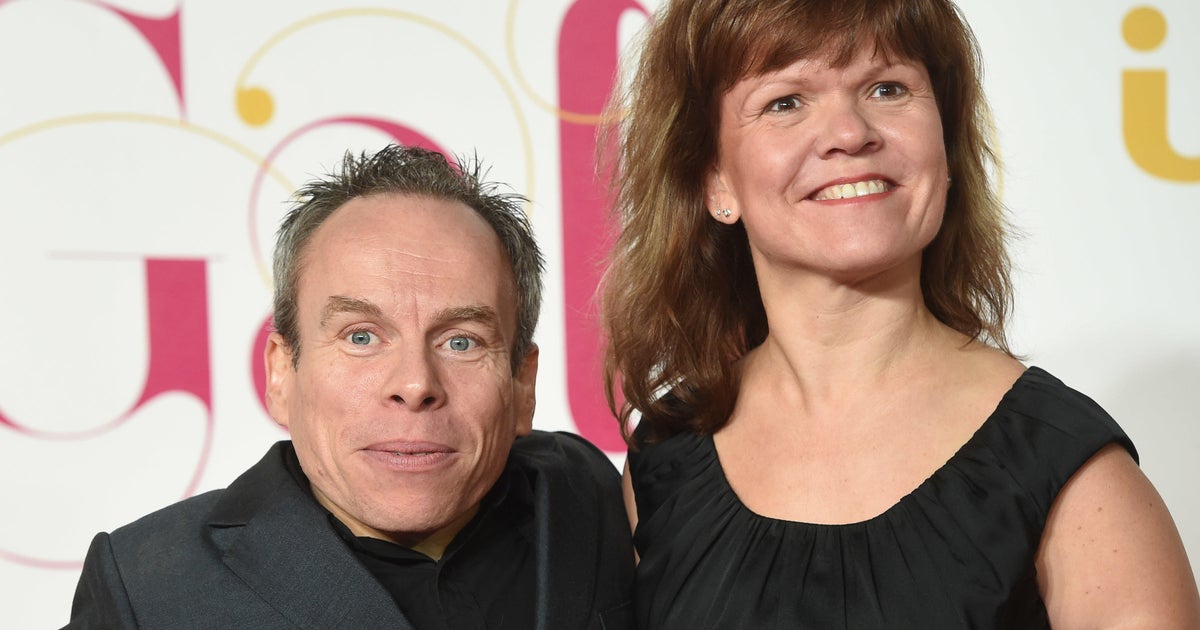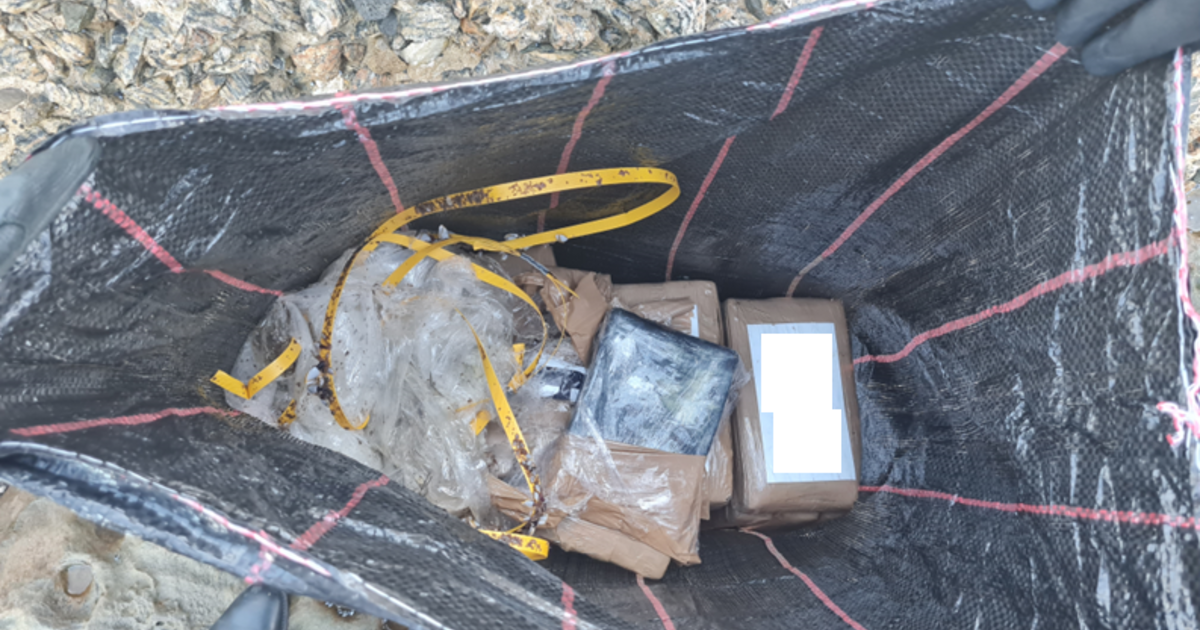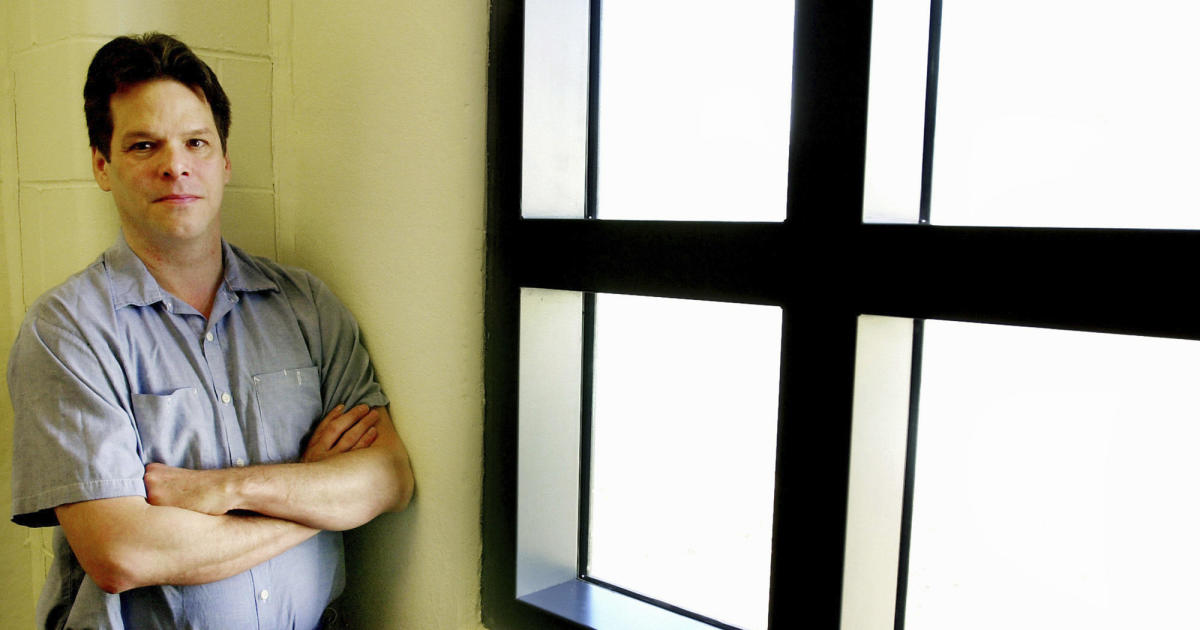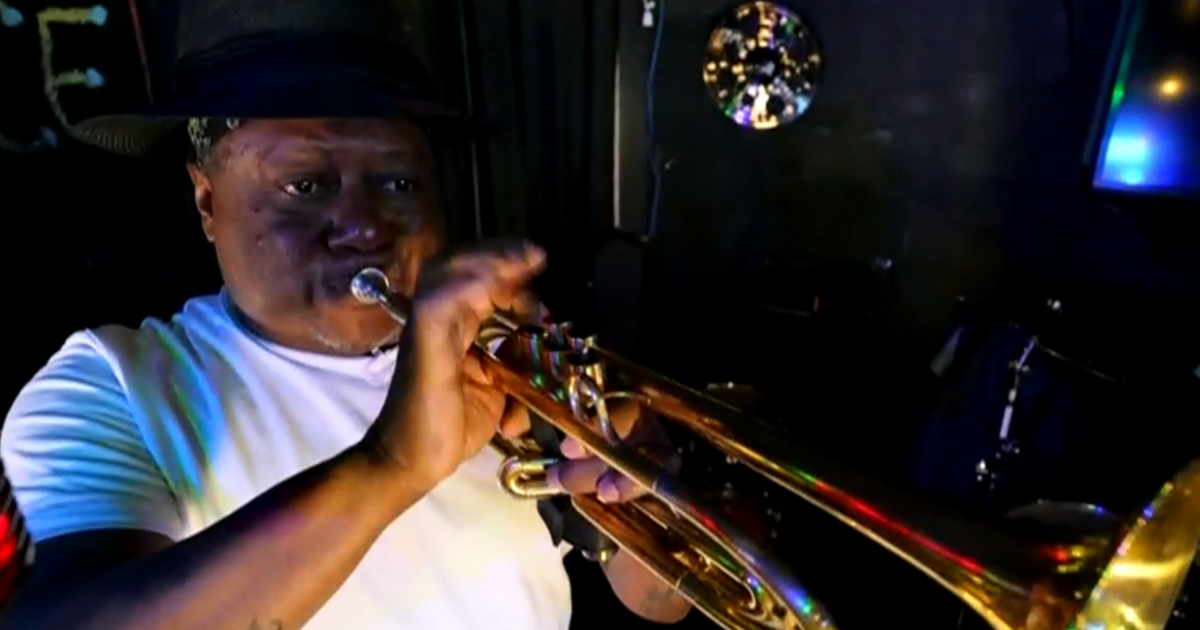The search for answers in Colorado mom's shooting death
Produced by Lindsey Schwartz, Lauren Clark, Alec Sirken, Chuck Stevenson, Chris Ritzen and Doug Longhini
[This story previously aired on October 22, 2016. It was updated on August 24, 2019.]
EVANS, Colo. -- "It is incredibly unbelievable to see your kid lying in a bed with a bullet hole through them," said Jenna Fox.
The pain is always there for Jenna Fox and adoptive father Joel Raguindin over the death of their daughter, 28-year-old Ashley Fallis, in the early hours of New Year's Day 2012.
"After she died, even the day after she died, I -- in my mind, I couldn't comprehend that I would not speak to her every day," Fox said of the daughter she described as "vivacious -- full of life, funny."
Ashley, they say, would never leave her three kids -- Madelynn, Jolie, and Blake, all under 10 years old. It's unimaginable.
"She just loved her family, and she loved life," Fox told "48 Hours" correspondent Erin Moriarty. "She would never do anything like this.
Fox says that she and her daughter were extremely close.
"To be honest, they were like best friends," said Raguindin.
Ashley married her high school sweetheart soon after graduation. They had two daughters, but that marriage quickly fell apart. In April 2007, she met Tom Fallis. He seemed responsible, and ready for a family.
"And it seemed like their relationship progressed really quickly," said Raguindin.
Just months into their relationship, Ashley became pregnant.
"I think-- it was a way for them to feel more connected to each other in too short of a period of time," said Fox.
They had a son, Blake. Two weeks after he was born, the couple married. Soon, Tom Fallis also adopted the girls after their birth father gave up his parental rights. Ashley's family felt it was all moving too fast.
"We were not happy about that, and we had actually tried to talk Ashley out of it," Raguindin said.
Ashley and Tom Fallis had only known each other a short time. Her parents say they began to notice disturbing aspects of Tom's personality.
"I didn't like -- his mentality of -- being right all the time and fighting all the time and -- the aggression," said Fox.
Tom and Ashley settled in the small town of Evans, about an hour north of Denver. Ashley worked as a respiratory therapist, and Tom took a job as a corrections officer with the Weld County Sheriff's Office, working at the local prison.
"Joel and I were like, 'Pfff, that's the perfect job for someone who has an ego that needs to tell people what to do,'" Fox said. "I think he was a very insecure person and he wanted total control of her."
"Do you think you were a threat to Tom?" Moriarty asked Fox.
"Absolutely," she replied. "I was the one person that he could not isolate Ashley against."
Ashley was caught in the middle and the pressure on her only increased when Blake -- still a toddler -- was diagnosed with a chronic brain condition that required Ashley's constant attention. It all took a stressful toll on Ashley and their marriage.
"At any time during that, did you feel your daughter was depressed?" Moriarty asked.
"No, I think she was anxious and she was concerned and she would -- had a lot on her plate and -- I think overwhelmed," Fox replied.
"I would say that they were definitely going through some hard times," said Raguindin.
The stress was so great that they even considered divorce. But when talking to police after Ashley's death, Tom Fallis insisted that things were on the mend as the holidays approached:
Tom Fallis to police [crying]: We were doing so good.
They were planning to host a New Year's Eve party, and Ashley even thought she had recently become pregnant.
Tom Fallis to police: When we found out, when she had that positive test, it was like, all right, it's like we finally, like, got over everything.
She stopped taking medications out of precaution, and then, on the day of the party, Fallis says Ashley began to bleed and believed she had miscarried.
Tom Fallis to police: So she was kinda down today.
But Fallis says they forged ahead with the party and as the night went on, Fox says that the friction between her and Fallis began to surface.
"I always knew that Tom hated me," she said.
As the party was winding down, Fallis flew into a rage when he overheard one of the guests, Fox's brother, offering Ashley marijuana:
Tom Fallis to police: I told Ashley, I was like, "You don't need to get high." I was like, "If whatever happened today with the miscarriage," I was like, "It happened." … I was like, you know what? F--- your mom. F--- everybody. Let it go.
As Fox and Raguindin were leaving the party, they saw Fallis, still upset, go into the bedroom and slam the door.
Ashley followed them outside. It was around 12:40 a.m. when they said goodbye.
"And what was Ashley's demeanor like? Was she upset?" Moriarty asked Fox.
"No, she's kinda, like, 'Whatever.' Like, 'This is normal. This is Tom,'" she replied.
"We were the last ones to see Tom Fallis in a fit of rage," Raguindin said. "A fit of rage. Our daughter giving us hugs and goodbye kisses, and her standing on the front porch waving goodbye, and that's the last we saw of our daughter."
Ashley's autopsy shows that she didn't smoke marijuana that night, but Fallis says that after she put the kids to bed, Ashley came into the bedroom defiant.
Tom Fallis to police: She's like, "F--- you. If I want to get high, I'll get high." …I'm like, "Do whatever you want to."
As Fallis tells it, he was in their closet to change clothes, when suddenly he heard the sound of a gun being loaded from across the room.
Tom Fallis to police: She has a .9mm Taurus. She keeps it under her mattress. …she was behind the side of the bed. She was low.
He says it all happened so quickly. He was on his way out of the closet -- closing the door and asking Ashley what she was doing -- when he heard a "pop."
Tom Fallis to police: I heard that and there was smoke. I just ran over to her and I just grabbed her head. And I was holdin' her head and I reached up and I grabbed her phone and I dialed 911.
Tom Fallis to 911: "You're staying here! You are not leaving me! You are not leaving me!"
That 911 call came into the dispatcher at 12:50 a.m.
Tom Fallis to police [crying]: And I opened her eyes and I started talking to her. I was like, "I -- I'm right here. You're not leaving. You're not leaving me."
It was just 10 minutes after Ashley's family had left.
"Literally there was two squad cars coming into the neighborhood. We were between the two when we did a U-turn. It was shocking. And everything was happening so fast," said Raguindin.
Joel Raguindin and Jenna Fox didn't see Ashley again until they got to the hospital. Ashley had severe brain trauma from a gunshot wound to the head.
"Did you get to say goodbye?" Moriarty asked.
"Yes. Yes. Yeah, I don't know how you say goodbye," Fox replied.
"I'm just gonna ask you point blank, do you believe your daughter committed suicide?"
"No. Not at all. No," said Fox.
"From the minutes we last saw her alive, we've always known that Tom Fallis murdered her," said Raguindin.
QUESTIONING TOM FALLIS
In the early morning hours of New Years Day 2012, officers from the Evans Police Department responded quickly to the call from the Fallis home. Video of the scene was shot by first responders.
Evans is a peaceful, low-crime community, says Police Chief Rick Brandt.
"I don't think we've had an armed -- maybe one or two armed robberies here since I've been here in almost eight years," said Chief Brandt.
Even though Tom Fallis had called in the shooting as a suicide, police brought him in for an interview early that morning, while his parents watched the children. Investigators were suspicious right away, because neighbors said they heard yelling. Fallis was questioned by Detective Rita Wolf:
Det. Wolf: Then she's telling you to get off of her.
Tom Fallis: I wasn't on her.
Det. Wolf: So somebody's just making that up, Tom?
Tom Fallis: My wife never told me to get off of her.
Det. Wolf: And so, when you went upstairs and you were arguing with her. The wound on the back of her head isn't where she could do it herself, Tom. It's not.
Tom Fallis [pounding table]: Oh bulls---! Bulls--- Bulls--- Bulls---! I didn't shoot my wife!
Investigators also searched his body and noticed scratches on his chest. Fallis says he scratched himself:
Tom Fallis to police: Because I just shaved my chest. I just shaved it, because I've never done it before … I'm sitting there going like this with my shirt. Because it itches, it scratches.
Fallis gets increasingly agitated as Wolf continues her questioning:
Tom Fallis: You're accusing me of killing my wife. I'm not supposed to get upset? That doesn't make sense…
Det. Wolf: You were upset before this.
Tom Fallis: Yeah, 'cause I've been here the whole time.
Det. Wolf: You are known to blow off the handle, is what they're saying.
Tom Fallis: I did not shoot Ashley. I did not shoot my wife. I didn't shoot the mother of my kids.
Police also found evidence that raises questions about Tom's version of events: pictures seem to have been ripped off the wall, indicating a struggle, divorce papers were found on the dresser, Ashley had bruises on her legs, and Fallis had been angry at the end of the party.
"How angry was he at that point? Moriarty asked Fox.
"He was very angry, very angry. I mean he said, 'I wish you would all f---ing die,'" she replied.
Det. Wolf: You were mad at the fact that she was listening to her mom.
Tom Fallis: I've already told you that.
Det. Wolf: Yeah.
After he was questioned that first morning, Fallis was released without charges.
"Were you expecting Tom to be charged? Moriarty asked.
"Yes. Oh yes, we were shocked. We were shocked that they let him go," Raguindin said.
Despite their concerns and evidence pointing to possible homicide, the coroner ruled Ashley's death a suicide on January 5 -- four days after it happened and before forensic testing was completed. The case was officially closed two months later.
"…the fact is, if there was evidence to support a probable cause finding on Tom, we would have arrested him," Brandt told Moriarty.
Ashley's parents could hardly believe it.
"She would never do anything like this," Fox explained. "She has a mission for Blake."
With Tom Fallis free of any charges, he moved with his children to Indiana to attend graduate school. Ashley's parents had lost their daughter, but they didn't want to also lose their grandchildren. So they maintained a relationship with Tom.
"He's in another state with my grandkids. It's crazy," Raguindin said. "And we continue to do what we need to do because our love for our grandkids is much, much greater and more powerful than the hatred we have for Tom Fallis."
But then, two years later, came an unexpected twist. A local television news reporter began his own investigation.
"It's not very often that you hear someone confess to murder and get away with it," said Justin Joseph.
CASE CLOSED?
In early 2014, Jenna Fox and Joel Raguindin were still convinced their son-in-law, Tom Fallis, murdered their daughter, Ashley, after the New Years party in 2012.
"How would you describe the last two years?" Erin Moriarty asked Fox.
"It's definitely a roller coaster. It's hard to grieve," she replied.
"But why would he kill her?" Moriarty asked.
"Out of anger," Fox explained. "I think it's a high possibility because of the divorce papers, because of everything that was going on."
But the Evans Police Department did rule Ashley's death a suicide and closed the case. And it remained closed until reporter Justin Joseph got a call.
"I had a source with law enforcement who called me and said, 'Something isn't right about this case,'" said Joseph, who is also a CBS News consultant.
Joseph spent months investigating and interviewing neighbors who had initially spoken to police. In April 2014, he got a major break:
A young next door neighbor, Nick Glover, told Joseph something about Tom Fallis that was not in the police reports.
"I saw him walk out, so we all ducked underneath the window sill, and his parents were standing outside and he's saying, 'Omigod I can't believe I did it', three or four times…. And then his parents said, 'What? What are you saying?' And I remember I heard him … say, 'I shot her,'" he told Joseph.
Nick Glover said he told that to Evans Police Officer Michael Yates.
"And he said, 'Detective Yates sat right here where you're sitting and heard my story and wrote everything down,'" Joseph told Moriarty.
And then Joseph reported corroboration of Glover's story. A sheriff's deputy at the scene came forward, two years later, to tell investigators he also heard Fallis say he shot Ashley.
Nick Glover's mother, Kathy Glover, also spoke to Joseph, telling him she had gotten a call that night from another neighbor-- a teenager named Chelsey Arrigo.
"And she said, 'Yeah, Chelsey called me that night right after it happened and said, "Tell me you called police, your neighbor just shot his wife."'"
This came as shock, because in Yates' official police report, he writes that Kathy Glover told him that Arrigo said, "Your neighbor just shot herself" -- a major discrepancy.
"So, the Glovers were never presented an opportunity to review their statements. They thought for two years that their statements were correctly recorded. And they thought that the Evans Police Department simply declined to prosecute. And so they were as shocked as everyone was to learn that the statements were omitted and the statements were changed," Joseph explained.
"I think it's a question of one individual's word against another," Chief Brandt told Moriarty.
"To this day, Officer Yates insists that Nick Glover never told him that he actually overheard Tom Fallis saying he shot his wife?" Moriarty asked.
"That's correct," said Brandt.
"What about Kathy Glover's claim, who says that she got a call saying, 'I hope you've called the police, your neighbor just shot his wife.' Did, in fact, the witness say that to Officer Yates?"
"Not according to Officer Yates," Brandt told Moriarty.
Still, Chief Brandt can't explain why his officers failed to do a follow up interview with Chelsey Arrigo. They knew from the very first night she had heard Ashley yelling "get off me."
"But Chelsey Arrigo was an earwitness," said Moriarty.
"She was," Brandt agreed.
"And you didn't go back and interview her. Why not?" Moriarty asked.
"I can't answer that. But I think that was an error," Brandt replied.
"A serious error, wasn't it?" Moriarty pressed.
"I would agree with that," said Brandt.
Ashley's parents believe the omissions are part of a cover up by Evans Police.
"Evans Police Department decided to cover up her death as a suicide from the very beginning," Raguindin said. "Now the big question is, why?"
Chief Brandt insists there was no cover up— that his officers just made some mistakes.
"There's this allegation that there was some kind of cover up. OK, if that happened, somebody's gonna find it," he said. "To my knowledge, none of that happened."
But Brandt can't really explain why his department concluded so quickly -- just days after Ashley's death -- that she committed suicide, especially when there was so much circumstantial evidence pointing to foul play.
The pictures, the divorce papers -- numerous witnesses at the party reported that he was angry that night.
"Aren't all those inconsistencies very troubling?" Moriarty asked the police chief.
"I'm not informed to that level of detail on cases. I get kind of overviews, briefings. Where we're at. So much of the detail that you're talking about now, in hindsight, after reviewing it, yes -- those draw questions," said Brandt.
Chief Brandt says his less-experienced officers called in the CBI, the Colorado Bureau of Investigation, for assistance, and then, later, closed their own investigation.
"So, I mean that's a really important question. Why would you close the case when you still have lab results pending?" Moriarty asked Brandt.
"I think that was a mistake. I don't think you do close a case when there's lab results pending," he replied.
"So why was it closed?"
"I can't answer that question," Brandt replied.
"But this is your department," Moriarty noted.
"It is my department, but I don't run investigations," he said.
In fact, Chief Brandt says he didn't know there were questions about the investigation until Justin Joseph's reports two years later.
"You know, the first time I became aware of problems or issues with this case was when Fox 31 called me for an interview. And that's frankly the first time I started even reviewing the report in any kind of detail," he said.
Justin Joseph's reporting got the case reopened and reinvestigated by a larger, neighboring police department in Fort Collins – all with the full cooperation of Chief Brandt.
"This new information includes alleged eye and earwitness accounts, that we were previously unaware of, and are of a serious enough nature to warrant further investigation of this case," Chief Brandt addressed reporters.
"I feel like it's a relief. It's been a lot of work, but I'm really relieved by it," Fox said. "I mean, it doesn't bring Ashley back by any sense at all, but I think I just want the truth out there."
What did Tom Fallis think of the developments? Joseph surprised him during a return trip to the area:
Justin Joseph: Wonder if we could talk to you about the death of your wife.
Tom Fallis: I'm not talking to you about this -- the investigation was already done and the investigation was already ruled she committed suicide.
Curiously, more than two years after her death, Fallis produced for police what he said were suicide notes that Ashley had written. One said:
"Dear Tom…. I'm sorry for your pain... I am a failure at everything... I find myself not even liking my children. I do love them; I just can't take this life any longer."
"I think the most curious thing about those letters is that when … we were told it was a suicide, these letters never appeared. These letters just came recently," Fox said. "If there was an investigation that was going on for me, and I had information, I would … give it to the police at that point."
"What I would like to see happen is truth and justice," Raguindin added. "I would like to see Tom charged with the murder of my daughter."
In November 2014, a grand jury indicted Tom Fallis for the murder of his wife. The next day he was arrested in Indiana. After three years of freedom, thinking this was all behind him, Fallis suddenly found himself in jail and separated from his children, who were now being cared for by his parents.
"…it was like an answered prayer and a weight just being lifted off," Raguindin said of Fallis' arrest. "And to just feel that sense of justice has taken place."
In March 2016, the trial begins. Tom Fallis is ready to put on a vigorous defense.
CONFLICTING THEORIES
With her first words to the jury, Tom Fallis' defense attorney Iris Eytan came out fighting for her client.
"Tom Fallis did not kill his wife and mother of their three children," she told the court. "Ashley Fallis committed suicide on January 1st, 2012," she addressed the court. "Ashley Fallis was a beautiful woman, but she had a terrible pain inside … She had documented mental illness, was impulsive and self-destructive and shot herself in the instant of her crisis with her own handgun."
And surprisingly, the defense used the prosecution's own witnesses to make their case: that Ashley, already a volatile personality, was drinking heavily the night of the party.
"She was intoxicated, she had just suffered a miscarriage, she was a pressure cooker," Eytan continued in court.
Ashley's uncle, cross examined by another defense attorney, admitted there was a history of suicide in the family:
Dru Nielsen: Both your mother and your brother died from self-inflicted gunshot wounds to the head.
John Schmitzer: That's correct.
However, Ashley's therapist, Dr. Russell Johnson, told the jury that he did not consider her to be a danger to herself:
Prosecutor Ben Whitney: When you met with her in December 2011, did she seem depressed to you?
Dr. Russell Johnson: No she did not.
Prosecutor Ben Whitney: Did she seem suicidal to you?
Dr. Russell Johnson: No she did not.
But when pushed by the defense, Dr. Johnson acknowledges that he was unaware of all the medications Ashley was taking -- including prescriptions she received from other doctors.
Defense attorney Iris Eytan: …you didn't actually know how many pills of Seroquel, and how many milligrams she was taking in December 2011, do you?
Dr. Russell Johnson: No.
Ashley had apparently withheld other crucial information from the doctor, including those alleged suicide notes she had written to Tom:
Defense attorney Iris Eytan: And you didn't know… that she had written a second suicide noted dated July 24, 2011, correct? She didn't tell you that, did she?
Dr. Russell Johnson: No.
Defense attorney Iris Eytan: Would all these things, Dr. Johnson, change your thinking about Ms. Fallis' state of mind?
Dr. Russell Johnson: Yes.
But, when Jenna Fox was questioned by prosecutor Ben Whitney, she repeated what she and her husband, Joel Raguindin, have said all along: that Ashley was fine throughout the party and that Tom was the one who erupted at the end the night.
Jenna Fox: He came up the stairs and came right in front of me, and told me he "f------g hated us all and wished we would all die." And went into their bedroom and slammed the door.
Prosecutor Ben Whitney: What was Ashley's demeanor like?
Jenna Fox: She seemed fine. She just seemed frustrated, maybe embarrassed.
And, there are those key witnesses that Justin Joseph spoke to following Ashley's death: Nick Glover, the next-door neighbor who said he heard Tom Fallis confess, tells the jury he remembers it all very clearly.
Nick Glover: What I heard him saying, "Oh my god. Oh my god. What have I done? Oh my god, what have I done?" …And he proceeded to say "I shot my wife."
Prosecutor Anthea Carrasco: How certain are you, or are you not, that the voice that you're hearing is Tom Fallis' voice that you're seeing standing in that quadrant of your driveway?
Nick Glover: I -- 100 percent. …I wouldn't forget, or not hear something like that and not remember it.
But Tom's parents deny that conversation ever happened.
Defense attorney Dru Nielsen: Did you ever hear Tom confess at that time, to shooting Ashley?
Jim Fallis: Never.
And others who were right there with Nick that night say they also didn't hear it. Nick's mother, Kathy Glover, then tells the jury about that 1 a.m. phone call she got from neighbor Chelsey Arrigo.
"When I answered the phone, she said 'Please tell me you called the police. …Because your neighbor just shot his wife,'" Kathy Glover testified.
But her story is undercut when Chelsey Arrigo herself takes the stand and says she doesn't even remember the call:
Chelsey Arrigo: All I remember was hearing some arguing. But that's it.
Prosecutor Ben Whitney: Do you recall any particular statements?
Chelsey Arrigo: No.
Prosecutor Ben Whitney: Do you recall telling Kathy Glover in a phone conversation that same early morning, "I heard her screaming, 'Get off me. Get off me.'?"
Chelsey Arrigo: I do not.
She admits that she was intoxicated that night, and fails to corroborate any of the significant statements that investigators say she gave after the shooting. Still, Weld County Sheriff's Deputy Chris Graves also says he overheard Tom Fallis confess to killing Ashley.
"I heard him screaming, 'I can't believe I shot her.' And 'I can't believe she's dead,'" Graves testified.
But his reliability as a witness is also put in doubt when he admits that he didn't notify his superiors until two years after the shooting—after the case was re-opened:
Prosecutor Anthea Carrasco: …do you draft a report about what you heard?
Chris Graves: No ma'am. …It was Evans' case.
Prosecutor Anthea Carrasco: Is that something you feel like you should have done?
Chris Graves: Absolutely.
The forensic testimony from the night of the shooting is crucial. The state's expert, Dan Gilliam, who spent 400 hours examining the case, explains to the jury where Ashley's head had to have been when the fatal shot went off.
"She has to be down in this position – somewhere like this," Gilliam explained as he bent to his knees in a model of the Fallis bedroom. "...the rod going through my head has to line up with this rod."
But on cross examination, his conclusion seems to favor not the prosecution's case, but the defense:
Defense attorney Iris Eytan: The most probable result of Ashley Fallis' shot to her head was a result of it being self-inflicted, correct?
Dan Gilliam: I believe so.
Defense attorney Iris Eytan: So, suicide? Correct?
Dan Gilliam: Yes.
To counter this, the prosecution calls a second, nationally-renowned forensic expert, Jon Priest, who tells the jury that he concluded the opposite— that Tom had to be near Ashley when she was shot.
"My ultimate opinion is that at the time the shot was fired, Tom and Ashley Fallis were in contact with each other, or near each other," Priest testified.
Priest suggests to the jury that the evidence shows the two of them could have been struggling as the gun went off.
"We could be struggling over this firearm, to where I've got it up against her head, threatening yelling, whatever," Priest explained, demonstrating in the model of the bedroom. "I could have it here, she could be reaching up and grab it at the time of the discharge. Firearm goes off, I could drop the firearm, pull her into my hip turning to create this stain and then come back down here onto the floor."
So, was it murder? Or did Ashley Fallis take her own life? Faced with conflicting theories, the jury will have to weigh the often contradictory evidence.
"Had she struggled at points in her past? Sure. Have a lot of people? Absolutely. Does that mean she committed suicide? No," Prosecutor Anthea Carrasco addressed the court. "She was fine … He's in a rage. …That's the man that was in that house. That's what's going on in his head, that's what's going on in his heart, and that is the person that was in that bedroom with Ashley Fallis."
"They have to prove that he had her gun, beyond a reasonable doubt. Held a gun to her head, beyond a reasonable doubt. And pulled the trigger, beyond a reasonable doubt. You all must be convinced of that," Iris Eytan told jurors.
Tom Fallis' future hangs in the balance.
A VERDICT
"To see him in the courtroom I felt like I had -- we had a shot of hope that justice would be served," said Joel Raguindin.
As key witnesses for the prosecution, Ashley's parents were not allowed to view much of the trial outside of their own testimony. But from what they heard from those inside the courtroom, the case against Tom Fallis might not be the slam dunk they thought it would be.
But Jenna and Joel remained hopeful as the case went to the jury; however, they soon got a jolt.
"The jurors were out how long?" Moriarty asked.
"Three-and-a-half hours," Fox replied.
"Three-and-a-half hours, and an hour of that was their lunch," said Raguindin.
"Did that seem right, three-and-a-half hours?" Moriarty asked.
"No," said Raguindin.
Four years after Ashley's death, the judge read the jury's decision:
Judge: We the jury find the defendant Thomas Fallis not guilty of murder in the second degree and all lesser included offense.
Tom Fallis was free.
"Tell me that moment when you heard the verdict," said Moriarty
"Shock," said Raguindin. "I was just, like, here – 'Tom just got away with murder again,'" said Fox.
For Ashley's parents, the speed of the verdict made it even worse.
"To me, they're talkin' about the -- the life of my daughter and the well-bein' of my grandchildren. And for them to make that decision -- " said Raguindin.
"That quickly—" Moriarty said.
"--is sickening to me. It really is. It's-- it's-- it's haunting," he continued.
"It is a lot of information. That you could spend three-and-a-half hours not -- I don't get it. I really don't get it," said Fox.
Two of the jurors, Dillon Pierce and Davana Mijares, were willing to explain their verdict.
"I did realize immediately that -- there are lives at stake here. Not only Tom's life, but the children as well," Mijares told Moriarty. "…if he was guilty I was looking for that. …I looked at him, I studied him and I just couldn't see it. But I did want to find him guilty if he did it … I wanted to be that voice for Ashley if he did it."
But jurors say that in the isolation of the courtroom, the case seemed straightforward. They believed Ashley Fallis was in a dire mental state, which led her to take her own life.
"Was this a case of reasonable doubt for you all? Is this just there wasn't enough evidence to go, or are you absolutely convinced you know what happened?" Moriarty asked the jurors.
"I'm convinced," said Dillon Pierce.
"I think it was a perfect storm just waiting to happen," said Mijares.
Mijares believes, though, that the truth of what happened may not have been what either side presented in the courtroom.
"I think that the argument that they had that night was probably a little bit more intense. …But I don't think that he did it. …I don't think that he actually pulled the trigger," Mijares continued. "There was nothing there that said Tom was holding the gun. I just – I -- I just couldn't put it there."
And, they question how the case even made it to trial.
"I don't think there was enough evidence to reopen the case. I think the case was reopened just due to … pressure from the media," said Mijares.
"I feel that's what Jenna Fox and Joel Raguindin were out to do," Pierce said. "They were out to get justice for Ashley. ...They needed some media attention to reopen the case."
"For me, my job as a reporter were to get as many facts out there and to get those to the jury. …And I certainly have no regrets about the integrity of our reporting," Justin Joseph said. "But in the end … the police department and the Weld County Sheriff did not do their jobs the night this happened … they didn't have what they needed to … be able to decide whether or not Tom Fallis pulled the trigger. …And from that standpoint, the jury made the right decision."
Tom Fallis declined to speak with "48 Hours."
The verdict changes nothing for Ashley's family. They still believe Ashley would never take her own life and leave her children behind.
"Is it at all possible that she just -- after her husband got so angry with you she just couldn't handle the stress and she took her life?" Moriarty asked Ashley's parents.
"No way," Raguindin replied. "Absolutely not."
"I don't think so," Fox said. "No."
As they wrestled with their frustrations after the verdict, Ashley's parents could barely contain their emotions during their interview with Moriarty …
"I know you're pissed, but don't…" Fox said to Raguindin. "I'm f-----g pissed goddamnit," he replied and left the room.
…especially because of how they believe their daughter was portrayed in court.
"They made her look bad by callin' her a spitfire, and this jury fell for it?" Fox said in tears. "They were up there callin' her a spitfire like it was this bad thing. And it just -- that's what he used to call me -- 'My spitfire—'"
"It's a person---it's a person who loves life, has a passion for life," said Raguindin.
"I think Jenna Fox is-- is angry, understandably," said Mijares.
"She doesn't have any power in this situation. She keeps looking for this -- for a way to take back control of what's happening. And there's no power… and that -- that sucks," said Pierce.
"I mean, I'm going to say -- we're not parents in denial. I mean, that's just not the case," said Fox.
"Every day this is the battle, is that -- we live with -- we're having to live with what the jurors came up with and it is not easy. But we are also -- we, me and Jenna, are both fighters. And the truth is the truth. And it always will be in our minds, in our hearts," an emotional Raguindin said.
What lies ahead for their relationship with their three grandchildren – now back in Tom's care – remains unclear, but they are committed to preserving Ashley's memory in the childrens' minds.
"Madelynn, Jolie and Blake, I wanna talk to you about your mother. She loved you guys wholeheartedly—wholeheartedly," Joel Raguindin said. "She loved life … And that -- because she loved life so much, Erin, that's why I know that my daughter would never take her own life."
The children remain in Tom Fallis' custody in Indiana.
Jenna Fox and Joel Raguindin now have visitation rights.
